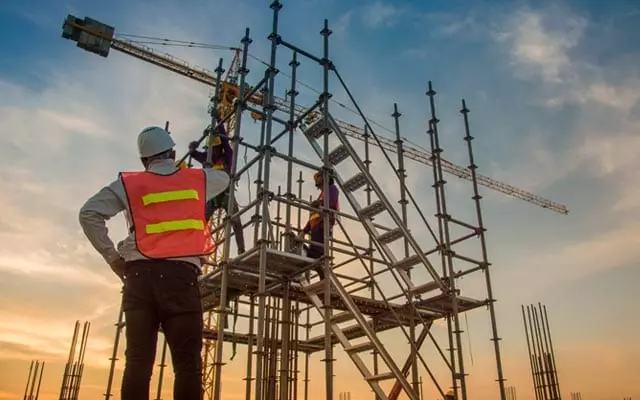Tubular vs Modular Scaffolding: Which Is Right for Your Project?
- Nabiha A.
- May 13, 2025
- 3 min read
Index:
Introduction
Scaffolding is essential in construction, renovation, and maintenance projects. Choosing the right type can improve efficiency, safety, and costs. In Malaysia, especially in areas like Selangor and the Klang Valley, two popular options dominate the market: tubular scaffolding and modular scaffolding. But which one should you use?
This guide breaks down the key differences, benefits, and best-use scenarios so you can make an informed decision.
🔧 What Is Tubular Scaffolding?
Tubular scaffolding, also known as tube and coupler scaffolding, is made from steel or aluminium tubes connected with clamps and fittings. It's a common sight on construction sites across Klang Valley where projects often require adaptable support systems.
Key Features:
Highly customisable to fit complex building shapes
Requires skilled labour for assembly and dismantling
Time-consuming to erect compared to modular systems
Ideal for long-term projects with irregular layouts
Pros:
Flexibility in shape and design
Strong and durable structure
Cons:
Slower setup and takedown
Higher labour costs
🪜 What Is Modular Scaffolding?
Modular scaffolding (also known as system scaffolding) uses pre-engineered components that lock into place without the need for clamps. Many large-scale developments in Selangor prefer this system for its fast and efficient setup.
Key Features:
Quick assembly using standardised parts
Less dependent on worker experience
Ideal for repetitive or large-scale projects
Excellent for shorter timelines
Pros:
Faster installation and dismantling
Improved site safety due to uniform components
Cons:
Less flexible for non-standard structures
Might require investment in proprietary systems
🤔 Tubular vs Modular: How to Choose?
Choosing the right scaffolding depends on several factors:
1. Project Complexity
Tubular is better for custom shapes and historical restorations.
Modular fits regular and repetitive structures like high-rises.
2. Time Constraints
Modular is best for fast-paced or urgent timelines.
3. Budget
Tubular may have lower equipment costs but higher labour costs.
Modular can reduce labour costs with faster setup.
4. Labour Availability
Skilled workers? Go with tubular.
General crew? Modular is easier and safer to use.
Whether you're working on a boutique renovation in Shah Alam or a condo development in Subang Jaya, picking the right system for your Klang Valley project makes all the difference.
🏗️ Scaffolding Maintenance and Safety Tips
Regardless of type, regular inspection and maintenance of scaffolding is crucial for safety and compliance.
Best Practices:
Inspect scaffolds daily before use
Ensure all connections and joints are secure
Avoid overloading platforms with workers or materials
Train staff on proper scaffold use and emergency procedures
Keep platforms free of debris or slippery substances
Following these tips not only ensures compliance with DOSH regulations, but also significantly reduces the risk of worksite accidents. 🛡️
🚀 Did You Know?
In 2024, Malaysia's Department of Occupational Safety and Health (DOSH) highlighted modular scaffolding as a key player in reducing on-site accidents due to its safer, standardised design. ✅
📅 Conclusion: Make the Smart Choice
If your project is complex and long-term, tubular scaffolding offers unmatched flexibility. But if you're working under tight deadlines or on repetitive structures, modular scaffolding is likely your best bet.
Make safety and efficiency your top priorities. And when in doubt, consult a certified scaffolding supplier or engineer. Services are readily available throughout Selangor and the Klang Valley, making it easier than ever to get started on your project.
🤔 FAQs About Tubular vs Modular Scaffolding
1. Which is safer: tubular or modular scaffolding?
Modular scaffolding is generally safer due to its standardised parts and easier setup.
2. Is tubular scaffolding cheaper than modular?
Equipment-wise, yes. But the labour costs can be higher due to complex assembly.
3. Can modular scaffolding be used for curved buildings?
Not easily. For irregular or curved structures, tubular scaffolding is more suitable.
4. What type of scaffolding is used in high-rise buildings?
Modular scaffolding is commonly used due to faster setup and better stability.
5. Do I need a permit to erect scaffolding in Malaysia?
Yes. You must comply with DOSH regulations, especially for scaffolds above 4 metres. Always check local authority requirements.
Looking for reliable scaffolding for your project? 🏗️
Whether you need flexible tubular systems or quick-setup modular scaffolds, we’ve got you covered in Selangor and the Klang Valley. Contact us today for expert advice and competitive rental packages! 🌐✨













Comments